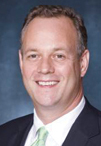By NANCY FRAZIER O'BRIEN
Recognizing a vital link between housing and a community's overall health, Bon Secours Richmond Health System is doing its part to promote safe, affordable housing and stave off neighborhood gentrification that leaves behind low- and moderate-income families.

Belde
"Providing the tools to help facilitate change in neighborhoods, one house at a time," is how Dave Belde, senior vice president of mission services for Bon Secours Richmond in Richmond, Va., sees the health system's role.
Becky Clay Christensen is administrative director for community development at Bon Secours Richmond, part of Bon Secours Mercy Health. She said of the system's support for affordable housing initiatives: "It's part of our commitment to seeing health broadly."
Housing can affect a community's overall health in multiple ways, for better and worse.
Belde explained, "The housing stock may be deteriorating in such a way as to create bad health outcomes. Even investment in repairs can help with the physical health of those living in the homes."
Christensen said "sick" housing — or housing that is in disrepair — can trigger asthma, aggravate other diseases and diminish well-being. In contrast, housing that is in good repair, in a neighborhood with a commitment to fight violence, and in proximity to sidewalks that invite people to exercise outside, all promote livability and wellness.
Homeownership can bind a family closer to a community, build economic stability and "help a community sustain itself," she said.

Christensen
In addition to providing economic and technical assistance to organizations like Habitat for Humanity and Richmond's project:HOMES, a nonprofit working in housing and neighborhood revitalization, Bon Secours Richmond has committed $250,000 a year to the Maggie Walker Community Land Trust. The trust buys land and builds or rehabs housing in key Richmond neighborhoods considered ripe for gentrification.
Permanent affordable housing
Under the land trust model, when the homes are sold to qualified low- or moderate-income buyers, the trust — named for the first woman of color to establish a bank in the United States — retains ownership of the land beneath them. Doing so reduces the cost of the home and therefore the down payment and monthly mortgage payments. Buyers pay $100 per year to lease the land under their house and pledge that when they sell, half of any profits will remain with the home, thus keeping prices low for the next buyer.
Because the trust retains permanent ownership of the land, the homes remain "permanently affordable for future homebuyers," the land trust explains on its website.
"Affordable housing can come in many forms, from emergency situations to keep people out of homelessness to an equity stake in homeownership," Christensen said. "The land trust model was the right context for us in many of Richmond's neighborhoods."
The Maggie Walker Community Land Trust has two ownership programs — one for qualified applicants whose household income is less than 80 percent of area median income and the other for applicants whose household income is less than 115 percent of area median income for their household size. Set by the U.S. Department of Housing and Urban Development, 80 percent of the average median income for the Richmond metro area is $66,550 for a family of four; at 115 percent that same family could make up to $95,700.
The health system's current level of investment in housing is "affecting homeownership opportunities for about 30 families," Belde said.

Bon Secours Richmond Health System funded the purchase of the land under this derelict house in the Randolph neighborhood in Richmond, Va., with a contribution to the Maggie Walker Community Land Trust. Bon Secours and the trust partnered with project:HOMES Richmond on the rehab. By owning the land, the trust keeps home purchase prices affordable.
Mixed-income neighborhoods
Christensen, who serves on the governance committee for the land trust, described the health system as a "key stakeholder" in the process. Bon Secours Richmond is "invested in the community land trust being successful as an organization," she added.
Christensen said it is important for the land trust homes to be in mixed-income neighborhoods, an approach which works to "deconcentrate poverty."
"There is value in mixed-income folks living in proximity to one another," she said. "The social value of engagement with each other" cannot be underestimated and can make the idea of mixed-income neighborhoods more of a mainstream belief both for higher-income and lower-income residents.
In addition, Christensen said, "equity growth is so much greater in neighborhoods with mixed-income dwellings because everyone gets to grow together; housing values are not suppressed."
Investment homework
Belde said it is important for any health system that is considering investing to promote affordable housing in their communities to have hard data in order to make "evidence-based investments." In the case of Bon Secours Richmond, that data came from a market value analysis of the Richmond area completed in 2017 by the Philadelphia-based Reinvestment Fund, one of the nation's largest community development financial institutions.
A further analysis of socioeconomic factors as they related to housing values, conducted by the Richmond Memorial Health Foundation and the Center for Regional and Urban Analysis at Virginia Commonwealth University's L. Douglas Wilder School of Government and Public Affairs, found that the median life expectancy in stronger housing markets in the region ranged from 79 to 83 years, compared to a median life expectancy of 73 to 78 in weaker housing markets. Belde said that in some disadvantaged Richmond neighborhoods, the lower limit on median life expectancy is 63 years.
"Because affordable housing is a critical health need in our community, we are committed to this work on a key social determinant of health," Belde said.